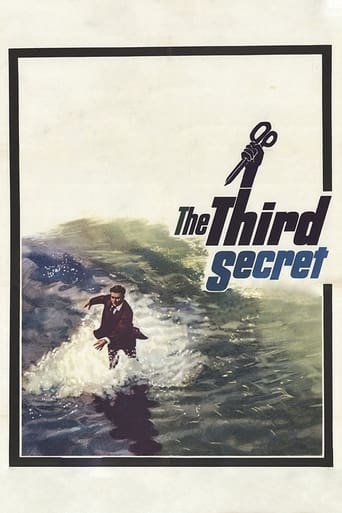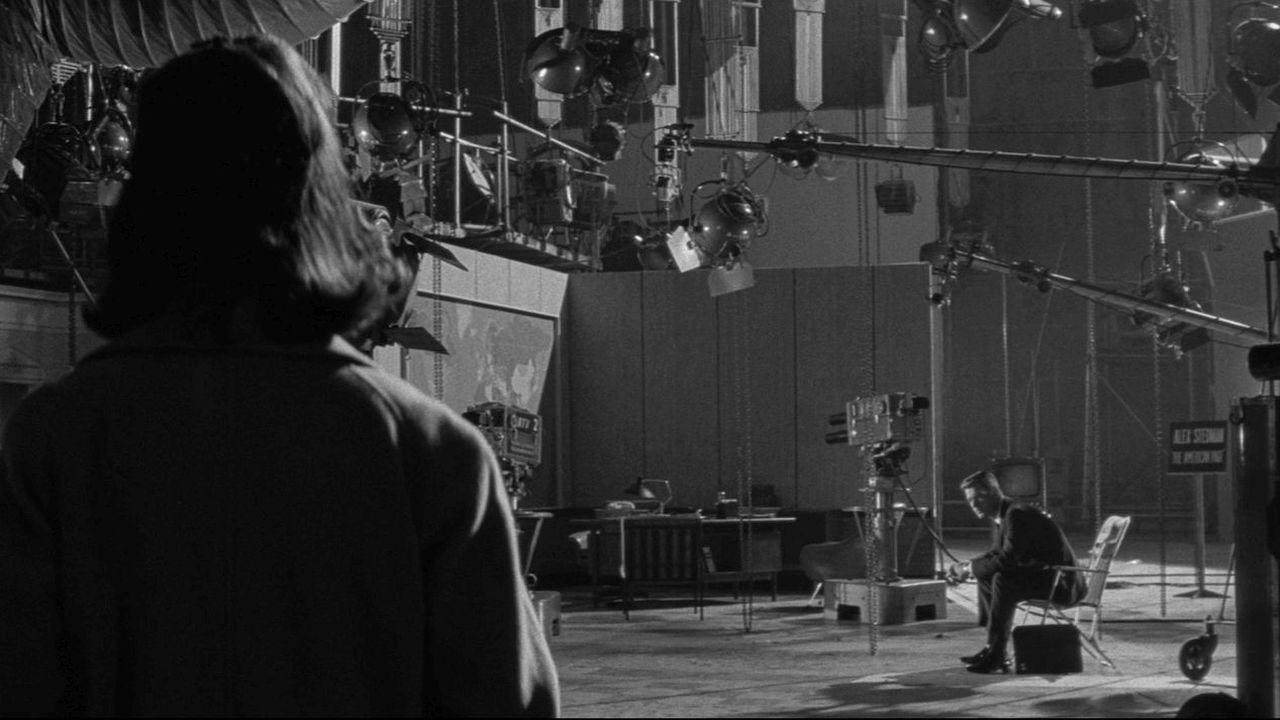robert-temple-1
This film has suffered from unjustifiable neglect. It is an intriguing film made with a high degree of intensity and seriousness. It contains what may perhaps be the finest performance by American actor Stephen Boyd, appearing in this otherwise British film. (Boyd died at the age of only 45 in 1977. He was mostly known for action films but clearly had deeper talents which were rarely seen.) The film was expertly directed by Charles Crichton. (He ended his directorial career with a bang, directing the huge hit A FISH CALLED WANDA in 1988, despite having been born in 1910. He had been a director for 44 years.) There are some very good lines in this film, and numerous odd and unusual touches. Take for instance the title of the film. Early in the film we are told that there are three kinds of secrets: the first are the ones we conceal from others, the second are the ones which we conceal from ourselves. We are left guessing about the third. But as the action progresses and so much is revealed, Boyd guesses the third kind: 'The third secret is the truth.' This high-level approach means that this film is not the usual run of the mill mystery film. The film starts with the murder of a prominent psychiatrist in his home. He was largely retired but retained a consulting room in his home for a tiny number of special patients. At first we believe there were four of them, but later we discover that there was a mysterious fifth patient. The death is ruled a suicide at an inquest, but the psychiatrist's young daughter, aged 10, insists that he was murdered by a patient. No list is known to exist of who the patients were, and the psychiatrist specially kept no files, at least none that can be found. The four patients of whom we know at first are played by Stephen Boyd, a prominent broadcaster, Jack Hawkins, a famous judge (filmed at Lincolns Inn), Richard Attenborough as an art dealer, and Diane Cilento as a pathetic glamorous woman who lives alone in a bedsit and cannot bear to be touched by men. Judi Dench plays a bit part but it is easy to miss her, as I must confess I did, despite seeing the film twice. The young daughter is played by Pamela Franklin, at her most intense and compelling. Probably she never was more intense, although that is what she specialized in. Certainly she more than fulfills the needs in this role, which positively required a child capable of drilling holes in people with her demanding gaze. My wife and I knew Pamela and her husband Harvey Jason very well indeed long ago, when she was grown up, and were involved in a film project with them which did not come to fruition because of financial corruption on the part of a distributor, and my refusal as producer to collude in it. Another actress whom I used to know, Patience Collier, appears in this film, but she too is easy to miss, as is also surprisingly the case with Nigel Davenport, who normally is impossible to miss. I refer to these invisibles in this mystery film as 'the case of the vanishing talent'. However, there is plenty of talent which does not vanish. The leading roles are all brilliantly played, and rarely did Richard Attenborough excel to this degree. Hawkins's performance of a man near to madness with anxiety is so impressive, and Diane Cilento never was such a waif in any other film, and is superb. The story is most ingenious, though under IMDb rules I cannot reveal the solution to the mystery, or mysteries. Pamela Franklin approaches Stephen Boyd and persuades him to investigate the murder, and gives him the names of three other patients, whom he meets and interrogates. There is very interesting footage of the south side of the Thames at Hammersmith, where the house of the murdered man is. Pamela and Boyd keep breaking in, despite its having been sealed by the police and about to be put up for sale against her wishes by her aunt and uncle who have become her guardians. Peter Copley, despite appearing only briefly, is excellent as the murdered man, and two superb oil portraits of him where made for the film, far better than the portraits one normally sees in films. I hope he was able to keep them, and I wonder who the artist was (uncredited). The evocative and moody cinematography was done by Doug Slocombe, with the excellent Chic Waterson as his operator. Waterson was an operator for 42 years and seemed never to want to graduate to cinematographer, one of the most extreme acts of modesty in the history of his profession. This film is highly recommended as a superior psychological mystery thriller.
Lechuguilla
The final fifteen minutes are quite interesting. But getting there is something of a chore. "The Third Secret" is the story of a famous psychoanalyst who suffers a gunshot wound. His maid finds him and, as he lay dying, he mumbles something to her. The ensuing headline reads: "Is it suicide?" How could a renowned psychiatrist take his own life? His 14-year-old daughter, Catherine (Pamela Franklin), goes to a famous TV reporter named Alex (Stephen Boyd), claiming it was murder, and insists that the killer must have been one of his patients.Sleepy elevator music at the film's beginning tips you off that what we have here is not a suspense film. It could be construed as a mystery. But mostly it is a drama. With a British setting and British actors, we can correctly describe this film as a British drama. A lot of the scenes take place indoors, on sets. There's a ton of dialogue. Actors recite pages of dramatic lines. I kept waiting for Katharine Hepburn to emerge, to render a ten-minute soliloquy.Characters trend bland and boring. The dialogue for Catherine is way too precocious for a 14-year-old girl.Still, the story's theme is deep. At one point, Alex asks an associate of the dead doctor: "Would it be possible for a (paranoid schizophrenic) to murder (the doctor) and make it look like a suicide?" Heavy stuff. The ending is fairly easy to predict. B&W cinematography is adequate if unremarkable. The camera is mostly static. There are some shadowy scenes toward the end. But overall, the visuals do not lend themselves to suspense. Casting and acting are acceptable.Stuffy and lacking humor, "The Third Secret" is an actor's film; all the players get to show off their dramatic skills. But as a viewer, I was mostly bored. I had hoped for more suspense. What I got was a slow-paced, old-fashioned British drama set mostly indoors, with a script that had too much dialogue. The film could easily have been set in the 1940s.
MARIO GAUCI
After a distinguished 15-year service for British cinema, director Charles Crichton (like several of his contemporaries) defected to TV at the start of the 1960s and only made the occasional feature film thereafter the most notable of which were this star-studded psychological thriller and his Oscar-nominated swan song, A FISH CALLED WANDA (1988). Irish actor-turned-Hollywood star Stephen Boyd plays the lead, an expatriate American newsman, who is engaged by precocious teenager Pamela Franklin to delve further into the mystery surrounding the would-be suicide of her celebrity psychiatrist father. She firmly believes that he was murdered by one of his very exclusive clientèle and pinpoints knighted Judge Jack Hawkins, mousy art dealer Richard Attenborough (who has a very young Judi Dench for his assistant) and insecure secretary Diane Cilento as the main suspects; a fourth was initially to have been played by Patricia Neal but her entire subplot was dropped prior to the film's release! After some initial trepidation (he does not want it known that he was also being treated by the dead psychiatrist) and anguish (feeling betrayed by the psychiatrist for abandoning him, he demolishes the latter's office in front of his daughter's very eyes!), Boyd approaches the 3 ex-patients who, understandably, are unwilling, unable or just too distraught (Cilento herself commits suicide after realizing the real reason why Boyd had slept with her) to be of any real use to him in the investigation. Consequently, when all available avenues seem to have led to a dead end, Boyd becomes cognizant of the possibility that the truth might be much closer to home than he at first suspected. Indeed, Franklin seems inexplicably hostile to her guardians (Rachel Kempson and Alan Webb) and bonds with Boyd instead through a game of 'complete the quotation' scribbled on walls (which she used to play with her late father). Co-written by its producer Robert L. Joseph, the film is, perhaps necessarily given the subject, full of pretentious chat but is also cleverly decked out with a Freudian dream sequence and the afore-mentioned starry cameos
which, actually, makes Pamela Franklin's outstanding performance all the more remarkable an achievement. Besides, in view of how the plot eventually works out, it is hard not to presume the influence of Orson Welles' fascinating MR. ARKADIN aka CONFIDENTIAL REPORT (1955) or the anticipation of Richard Rush's much-maligned COLOR OF NIGHT (1994)...
Mrs. B
Although it has been quite awhile since I've watched this movie, I do recommend it. I thought the suspense was well done. I also thought the storyline was pretty good for 1964 and it would be interesting to see a WELL DONE, modern remake.


 AD
AD




